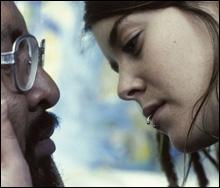 Let’s get the blow job over quickly, as Carlos Reygadas does in the opening scene of his grotesque and mystifying Batalla en el cielo|Battle in Heaven. The film opens with a close-up of naked Marcos (Marcos Hernández), a general’s chauffeur. A sweaty, overweight bearded guy in glasses breathing heavily, he’s posed before a blank background like one of Elsa Dorfman’s Polaroid portraits. The camera tilts down to show Ana (Anapola Mushkadiz), the vapid, sylph-like general’s daughter, apparently performing fellatio. A new camera angle proves that she is indeed deep-throating the guy. Marcos’s face reflects the stunned detachment of a steer about to be butchered. A close-up of Ana’s eyes shows a single tear and an expression that seems to be saying: what am I doing in this movie?
Let’s get the blow job over quickly, as Carlos Reygadas does in the opening scene of his grotesque and mystifying Batalla en el cielo|Battle in Heaven. The film opens with a close-up of naked Marcos (Marcos Hernández), a general’s chauffeur. A sweaty, overweight bearded guy in glasses breathing heavily, he’s posed before a blank background like one of Elsa Dorfman’s Polaroid portraits. The camera tilts down to show Ana (Anapola Mushkadiz), the vapid, sylph-like general’s daughter, apparently performing fellatio. A new camera angle proves that she is indeed deep-throating the guy. Marcos’s face reflects the stunned detachment of a steer about to be butchered. A close-up of Ana’s eyes shows a single tear and an expression that seems to be saying: what am I doing in this movie?
Marcos’s expression, however, almost never changes, and neither does his performance or those of the other characters deviate from the robotic. Every surreal, monstrous, occasionally beautiful image is seen from his frozen point of view, intensified by Reygadas’s tracking shots and languorous 360-degree pans: a Mexican flag the size of a tennis court unfurled at dawn; an old man carrying his catheter and urine bag down a subway corridor; a line of pilgrims marching to the basilica in honor of the Lady of Guadalupe. What do they mean?
What Reygadas doesn’t show is the film’s central event. Marcos and his wife have kidnapped a baby for ransom, but it has died. No wonder he seems distracted as he drives Ana to the “boutique,” a classy bordello where she gets her kicks and entreats him to get his as well. When he fails to perform, she asks him what’s wrong and he tells her. Later, his troll-like, equally obese wife (Bertha Ruiz) tells him that he’s an idiot, that he has fucked up. Then she asks him to forgive her.
So much for plot. Many shockers follow, not the least the identity of the baby. Reygadas dwells on these. Could the scene in which Marcos and his wife have sex in graphic, flaccid detail be deemed gratuitous and exploitative? Is it redeemed by a lack of affect interrupted by signs of undeniable tenderness?
Other directors have depicted similar ugly nakedness and shocking pathos: Bruno Dumont in L’humanité, Gaspar Noé in Seul contre tous. Those films drew the same critical fire that Battle is under now. Perhaps Reygadas deserves it when his indulgence in ugliness approaches self-parody. Unlike David Lynch, whom he at times evokes, he lacks innocence and humor.
He doesn’t lack the commitment of a visionary, however. Neither can he be accused of betraying his protagonist, to whose point of view he remains loyal, perhaps because in the end it’s the point of view of everyone. The observed world consists of rituals, flesh, icons, ticking clocks, serene landscapes, mindless debauchery, bodies and faces. It passes in excruciatingly long takes propelled by an uncomprehending urgency. Reygadas is obscene in the way only the most religious filmmakers can be. He does not shrink from looking because he knows that the terrible things he sees are the shadows of something beyond, an inhuman battle in Heaven.